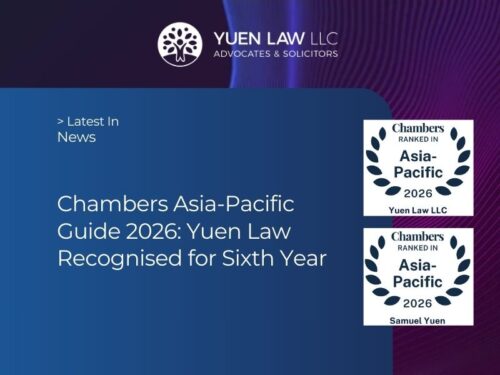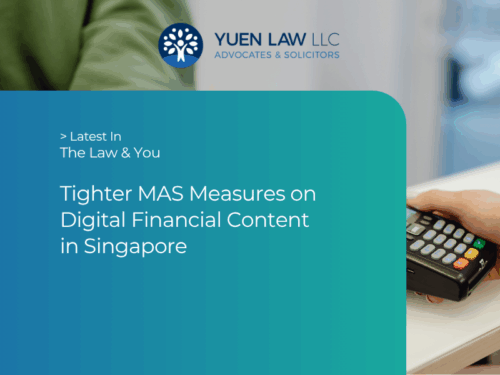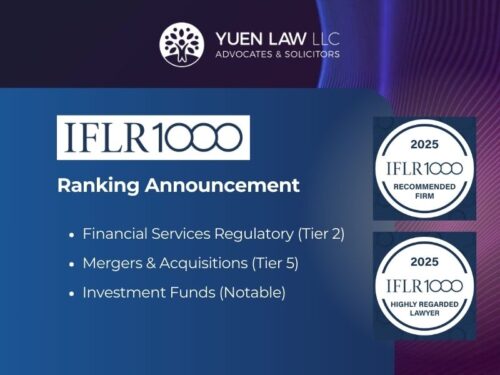The Corporate Service Providers Act 2024 (“CSP Act”) and the Companies and Limited Liability Partnerships (Miscellaneous Amendments) Act 2024 (“CLLPMA”) came into force on 9 June and 16 June 2025 respectively. Together, they impose a new compliance framework on corporate service providers, qualified individuals, and companies. The primary purpose of the amendments is to strengthen safeguards against money laundering, proliferation financing, and terrorism financing.
Corporate Service Providers Act 2024
Key Amendments
Businesses Providing Corporate Services Required to Register with ACRA
Under the Corporate Service Providers Act 2024 (“CSP Act”), no person may provide corporate services without first registering with the Accounting and Corporate Regulatory Authority (“ACRA”) as a Corporate Service Provider (“CSP”).
Previously, only businesses filing transactions with ACRA on behalf of customers were required to register as filing agents, and were therefore subject to anti-money laundering, countering the financing of terrorism, and proliferation financing (“AML/CPFT/PF”) obligations. The CSP Act significantly broadens this framework by extending the scope of “corporate services” and subjects a wider range of providers to regulation.
Expanded Definition of Corporate Services
The definition of “Corporate Service Providers” under the CSP Act is deliberately wide, capturing any person or business that provides “Corporate Services.” These services include:
a) forming, on behalf of another person, a corporation or other legal person;
b) acting or arranging for another person to act —
(i) as a director or secretary of a corporation;
(ii) as a partner of a partnership;
(iii) or in a similar capacity in relation to other legal persons;
c) providing a registered office, business address, correspondence or administrative address, or any other related services for a corporation, partnership or other legal person;
d) acting, or arranging for another person to act, as a nominee shareholder on behalf of any corporation, other than a corporation whose securities are listed on an approved exchange under section 2(1) of the Securities and Futures Act 2001;
e) carrying out any designated activity in relation to the provision of any accounting service;
f) carrying out an ACRA transaction with the ACRA Registrar using the electronic system —
(i) on behalf of another person; or
(ii) for one or more companies as a secretary of each of those companies.
In addition, carrying out certain “designated activities” for a customer falls within the scope of regulation, such as:
a) buying or selling of real estate;
b) management of client money, securities or other assets;
c) management of bank, savings, or securities accounts;
d) organisation of contributions for the creation, operation or management of corporations;
e) creation, operation or management of legal persons or legal arrangements, or buying and selling of business entities.
CSPs to Comply with AML/CFT/PF Obligations
CSPs are required to comply with AML/CFT/PF provisions in line with recommendations by the Financial Action Task Force. This includes carrying out Customer Due Diligence (“CDD”) at the start of engagements, and on an ongoing basis where suspicious activity arises or information appears inadequate. Where CDD cannot be completed, the CSP must decline the service and assess if a Suspicious Transaction Report (“STR”) should be filed. Even if the CSP decides not to file an STR, that decision and rationale should be documented internally.
Prohibition on Acting as Nominee Directors Unless the Appointment is Arranged by Registered CSPs and Have Been Assessed as Fit and Proper
The CSP Act restricts individuals from acting as nominee directors “by way of business” unless the appointment is arranged through a registered Corporate Service Provider (“CSP”). CSPs arranging nominee directors must ensure that the individual is fit and proper.
Based on ACRA’s guidelines for registers of CSPs, the Registrar may assess a person’s criminal or regulatory history, bankruptcy status, and past conduct as a key appointment holder or qualified individual. They also consider the person’s commercial integrity, including any professional misconduct, breach of fiduciary duty, serious negligence, or involvement in such conduct by others, as well as whether the appointment would be contrary to the national or public interest or affect the CSP’s ability to fulfil its regulatory duties.
This targets the misuse of nominee director arrangements for unlawful purposes, particularly in the creation of shell companies to facilitate money laundering or other illicit activities.
Introduction of Fines for Breaches of AML/CFT/PF Obligations by Registered CSP and Their Senior Management
The CSP Act introduces enhanced penalties for non-compliance with AML/CFT/PF obligations. Registered CSPs who fail to ensure compliance may be held personally liable.
On conviction, each breach may attract a fine of up to SGD 100,000. These measures align the sanctions for CSPs with those applicable to other designated non-financial businesses and professions in Singapore.
Companies and Limited Liability Partnerships (Miscellaneous Amendments) Act 2024
Key Amendments
Companies Must Include Nominee Directors in Register of Controllers
Since 31 March 2017, companies, foreign companies, and Limited Liability Partnerships (LLPs) have been required to maintain a Register of Registrable Controllers (RORC) either at their registered office or at the office of their appointed Corporate Service Provider. Previously, they were allowed a 30-day grace period from incorporation or registration to set up the RORC.
Effective 16 June 2025, the CLLPMA removes the 30-day grace period, requiring all newly incorporated companies, foreign companies, and LLPs to maintain their RORC immediately upon incorporation or registration.
These changes aim to enhance corporate transparency and align compliance timelines across all entity types.
Companies Must Check Annually with Every Registrable Controller on Their Particulars
Companies, foreign companies, and limited liability partnerships (“LLPs”) must verify the particulars of every registrable controller on an annual basis. This is done by giving notice to each controller to confirm whether their particulars remain accurate or if changes have occurred.
The timeline for updating controller information in the private register has also been extended from two business days to seven calendar days, providing entities with a more practical timeframe to comply.
Foreign Companies to Maintain a Register of Nominee Directors
Foreign companies are to maintain a register of nominee directors, unless exempted.
For this purpose, the requirement applies only to foreign companies as defined under section 2 of the Companies Act 1967:
(a) a company, corporation, society, association, or other body incorporated outside Singapore; or
(b) an unincorporated society, association or other body which, under the law of its place of origin, may sue or be sued, or hold property in the name of its secretary or another duly appointed officer, and which does not have its head office or principal place of business in Singapore.
Maintaining ACRA Central Registers of Nominee Directors and Nominee Shareholders
With effect from 16 June 2025, ACRA will maintain central registers of nominee directors and nominee shareholders (“Central Registers”).
Companies, unless exempted, must submit to ACRA the information currently kept in their private registers of nominees and nominators.
Companies and foreign companies incorporated before 16 June 2025 must make their first submission by 31 December 2025. Following the initial submission, any updates to the private register must be filed with ACRA within two days of change.
New companies incorporated on or after 16 June 2025 must file the information of nominees and nominators at the time of incorporation. This means that those intending to incorporate a company must disclose such information to their CSPs before the incorporation of the company is completed.
Once the information is filed with ACRA’s Central Registers, the nominee status of directors and shareholders will be publicly available and will appear in the business profile of the relevant companies. However, detailed information on the particulars of nominators will only be disclosed by the Registrar to law enforcement agencies under prescribed circumstances.
Increase of Fines in Relation to the Register of Registrable Controllers, Register of Directors, and Register of Nominee Shareholders
The maximum fine for offences relating to the register of registrable controllers, the register of nominee directors, and the register of nominee shareholders has increased to SGD 25,000. The amendments aim to improve the accuracy of information maintained in these registers.
What This Means for Your Business
The CSP Act 2024 and the CLLPMA 2024 directly affect companies, LLPs, and foreign companies that rely on corporate services in Singapore. You may be required to provide additional information and documentation, such as details of nominee directors and/or shareholders, to meet ACRA’s expanded disclosure obligations. Companies must also work with a CSP that is duly registered with ACRA, as only registered providers are permitted to render such services. With enhanced due diligence requirements, you may notice more stringent processes when engaging your CSP, particularly around verifying shareholder or controller information.
The Acts also introduce new restrictions on the use of nominee directors. Where a nominee director is appointed “by way of business,” the arrangement must be made through an ACRA-registered CSP, and as before, the nominee must meet “fit and proper” criteria. Brokering the arrangement through an ACRA-registered CSP who is subject to personal liability over such arrangements aims to limit unsuitable nominee arrangements and places greater responsibility on businesses to ensure compliance.
How We Can Support Your Business
We advise businesses on how these changes apply to their operations, including preparing and maintaining the registers of controllers and nominees, and ensuring accurate and timely filings with ACRA. Our team guides you through the new disclosure obligations so that your company remains compliant while continuing to operate efficiently in Singapore’s evolving regulatory landscape.






